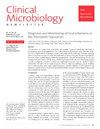Laboratory Diagnosis of Adenoviral Infections in Transplant Recipients
Q3 Medicine
引用次数: 0
Abstract
Adenovirus (AdV) is a common cause of mild respiratory tract and gastrointestinal tract infections in immunocompetent children and adults. Among hematopoietic stem cell (HSCT) and solid organ transplant (SOT) recipients, such infections can be severe and lead to significant morbidity and mortality. The prevalence of AdV infections in immunocompromised individuals varies according to the degree of immunosuppression and age, with such infection due to either primary infections or reactivation of latent virus. Diagnosis of AdV is frequently made using molecular test methods, mainly qualitative and quantitative polymerase chain reaction (PCR) assays. Qualitative-PCR assays provide a presumptive diagnosis of AdV infections, while serial quantitative-PCR assay results provide clinical specificity in determining the significance of AdV detection in immunocompromised patients. Since AdV can be detected in various clinical specimens obtained from asymptomatic individuals, clinical correlation of positive AdV DNA test results is essential for clinical management of HSCT and SOT recipients.
移植受者腺病毒感染的实验室诊断
腺病毒(AdV)是免疫功能正常的儿童和成人引起轻度呼吸道和胃肠道感染的常见原因。在造血干细胞(HSCT)和实体器官移植(SOT)受者中,这种感染可能是严重的,并导致显著的发病率和死亡率。AdV感染在免疫功能低下个体中的流行程度因免疫抑制程度和年龄而异,这种感染可能是由于原发感染或潜伏病毒的再激活。AdV的诊断常用分子检测方法,主要是定性和定量聚合酶链反应(PCR)检测。定性pcr检测提供了AdV感染的推定诊断,而连续定量pcr检测结果提供了确定AdV检测在免疫功能低下患者中的意义的临床特异性。由于AdV可以在从无症状个体获得的各种临床标本中检测到,因此AdV DNA检测阳性结果的临床相关性对于HSCT和SOT接受者的临床管理至关重要。
本文章由计算机程序翻译,如有差异,请以英文原文为准。
求助全文
约1分钟内获得全文
求助全文
来源期刊

Clinical Microbiology Newsletter
Medicine-Infectious Diseases
CiteScore
2.20
自引率
0.00%
发文量
35
审稿时长
53 days
期刊介绍:
Highly respected for its ability to keep pace with advances in this fast moving field, Clinical Microbiology Newsletter has quickly become a “benchmark” for anyone in the lab. Twice a month the newsletter reports on changes that affect your work, ranging from articles on new diagnostic techniques, to surveys of how readers handle blood cultures, to editorials questioning common procedures and suggesting new ones.
 求助内容:
求助内容: 应助结果提醒方式:
应助结果提醒方式:


